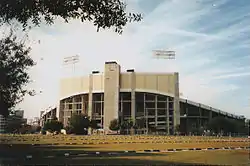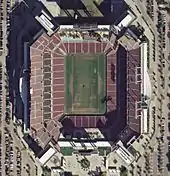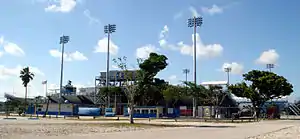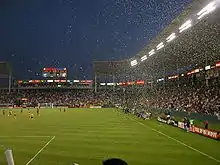Major League Soccer defunct clubs
Major League Soccer, the highest level of professional soccer in the United States, has a relatively stable history when it comes to franchises. Only three clubs, the Tampa Bay Mutiny, the Miami Fusion, and Chivas USA have ceased operations. The two Florida-based teams ceased playing after the 2001 season and Chivas USA folded after the 2014 season.
Defunct clubs
| Defunct teams | |||||
|---|---|---|---|---|---|
| Team | City | Stadium | Years active | ||
| Chivas USA | Carson, California | StubHub Center | 2005–2014 | ||
| Miami Fusion | Fort Lauderdale, Florida | Lockhart Stadium | 1998–2001 | ||
| Tampa Bay Mutiny | Tampa, Florida | Tampa Stadium1 (1996–1998) Raymond James Stadium1 (1999–2001) |
1996–2001 | ||
Tampa Bay Mutiny (1996–2001)

On April 13, 1996, The Mutiny were welcomed to Tampa with their inaugural game against the New England Revolution. The result was a 3–2 Mutiny victory. There were many stars on the team including Carlos Valderrama, Steve Ralston and scoring machine Roy Lassiter, who scored a record 26 goals in the season. The team was also coached by Thomas Rongen. As for the season, the Mutiny claimed the best record in the league at 20–12 and were the first winners of the Supporters' Shield. In the playoffs, they would be taken to a third game by the Columbus Crew before eliminating them. In the conference final, though, the Mutiny's remarkable season would come to an end as they were swept by eventual champions D.C. United.
In 1997, a season that saw coach Thomas Rongen leave to take the New England Revolution's vacancy, the Mutiny would replace him with John Kowalski. Under him, the Mutiny would continue to play well and finished the season with a record of 17–15. But the Columbus Crew would get revenge on the Mutiny for the previous year by sweeping them. After the season, Kowalski resigned from the club. In addition to getting a new coach, Tim Hankinson, in 1998, Star Carlos Valderrama would leave his original club to join their new Florida counterparts, the Fusion. As a result, the Mutiny would struggle through the season, finishing with a record of 12–20 and miss the playoffs for the first time.

In 1999, looking to rebound from their disappointing year, the Mutiny would get back Carlos Valderrama, and statistically and record-wise, didn't help the team much, but even with a record of 14–18, the Mutiny would make a return to the playoffs. But like two years ago, they would be swept by the Columbus Crew in the first round. Entering in the 2000s, the Mutiny would struggle through the first half of the season, but would pick it up again near the end of the season, finishing with a mediocre 16–12–4 record. But in the first round of the playoffs as the 4th seed, the Mutiny would be swept by the 5th seed Los Angeles Galaxy.
In 2001, Coach Alfonso Mondelo replaced the fired Tim Hankinson and the Mutiny would struggle mightily. In the middle of the season, Mondelo was fired and Perry Van der Beck attempted to revive the struggling franchise. On September 4, the Mutiny would drop a 2–1 decision to the Columbus Crew, and their record stood at 4–21–2. Unfortunately, that would be the last game the Tampa Bay Mutiny would ever play as the September 11th attacks on America cancelled the rest of the season. The Mutiny, along with the Miami Fusion, ceased operations on January 8, 2002, because they never found local ownership and the horrible season seemed to drive fans away.
Miami Fusion (1998–2001)

On March 20, 1998, the Fusion played their inaugural game as host to D.C. United and dropped a 2–0 decision. The Fusion picked up Colombian star Carlos Valderrama shortly after that. As the team struggled midway through the season, coach Carlos Córdoba stepped down and was replaced by Ivo Wortmann. Under Wortmann, the Fusion improved and made the playoffs with a record of 15–17. In the playoffs, the Fusion would easily be swept by D.C. United.
In 1999, the Fusion struggled out of the gate before catching fire in the middle of the summer. In the end, the Fusion would make the playoffs again with a less than impressive 13-19 record. Again, the Fusion were easily swept by D.C. United. In 2000, in Ivo Wortmann's final season as coach, the Fusion would do better than the previous year, but miss the playoffs with a record of 12–15–5.
In 2001, new head coach Ray Hudson brought a spark to the Fusion as they would dominate the league and sit in first place in the entire league for much of the season. After the September 11 attacks wiped out the final two weeks of the season, the Fusion claimed the Supporters' Shield with a record of 16–5–5. In the playoffs, the club would dispatch the defending champion Kansas City Wizards in three games, 6 points to 3 for their first playoff series win. The next round would see the Fusion give the San Jose Earthquakes all they could handle before falling to a Troy Dayak overtime goal in a series tiebreaker, Little did anyone realize this would be the Fusion's final game ever. In December, rumors began to fly that the Fusion and the Tampa Bay Mutiny would become disbanded. That would become reality on January 8, 2002. After only four years as a team, the Fusion ceased operations because of low attendance and a bad stadium deal.
Chivas USA (2005–2014)

On February 20, 2014, Major League Soccer purchased Chivas USA from Jorge Vergara, the owner of the Chivas since the team's inaugural season. They announced plans to sell to a buyer dedicated to keeping the club in Los Angeles, as well as a plan to rebrand the club in time for the 2015 MLS season.[1] ESPN reported on September 29, 2014, that the club would suspend operations at the end of the MLS regular season, according to multiple sources.[2]
On September 30, 2014, Grant Wahl of Sports Illustrated reported that a group of investors headed by Henry Nguyen, Los Angeles Dodgers investor Peter Guber and Cardiff City owner Vincent Tan agreed to purchase the club for a fee over $100 million. The sale would mean that Chivas USA would fold, with the second Los Angeles team to take the field as an expansion team in 2017 with a new stadium in Downtown Los Angeles.[3]
Chivas USA ceased operations on October 27, 2014, with its player development academy continuing to be operated by MLS until June 2015.[4] A dispersal draft took place after the 2014 season, having the remaining players from the club dispersed to other teams in the league.
Impact on Major League Soccer
The Mutiny was the only MLS team so far to have been owned by the league for its entire history. Once the Florida teams went defunct in 2002, it was taken as a sign that Major League Soccer was struggling because of its inability to find ownership for its clubs (in fact, at this point, there were only three owners in the entire league). Years later, league commissioner Don Garber said it was a difficult decision to shutter the Florida teams, but that it saved Major League Soccer in the long run.
After the folding of Chivas USA, its successor, Los Angeles FC, was expected begin play in 2017, pending the construction of its own stadium (Chivas USA shared a stadium with the Los Angeles Galaxy throughout its existence). Due to the site chosen for the Los Angeles stadium, it was announced that the new team would push back its first season until 2018.[5]
References
- MLS Communications. "Major League Soccer purchases Chivas USA". MLSsoccer.com. Retrieved February 20, 2014.
- "Chivas USA to suspend operations after MLS season, sources say". ESPN.com. September 29, 2014. Retrieved September 29, 2014.
- "Vincent Tan, Peter Guber, Henry Nguyen, Tom Penn included in front-running group to buy Chivas USA". SI.com. September 30, 2014. Retrieved October 1, 2014.
- "MLS announces new strategy for Los Angeles market, 2015 conference alignment". mlssoccer.com. October 27, 2014.
- "Expansion L.A. soccer team plans new stadium on Sports Arena site". Los Angeles Times. May 17, 2015. Retrieved May 18, 2015.